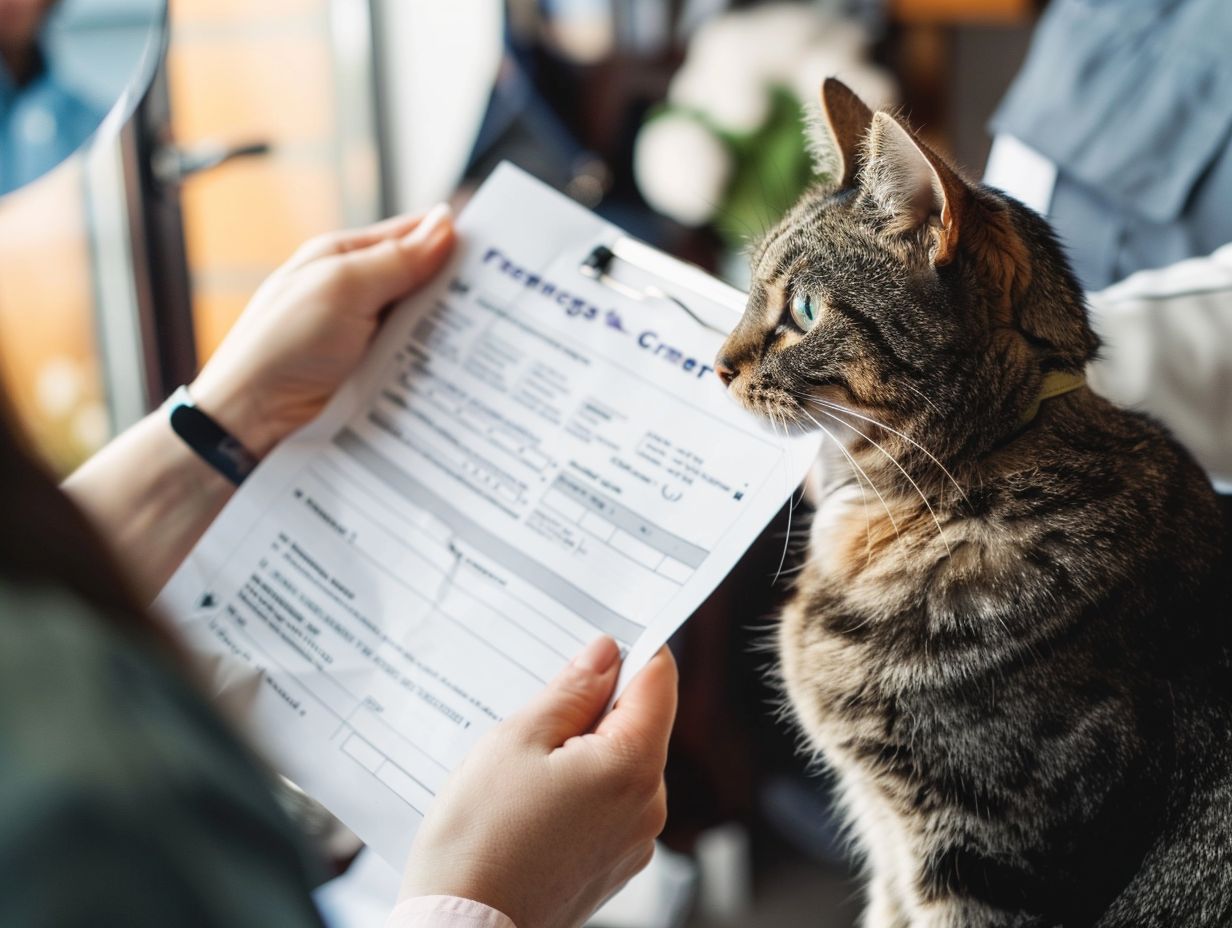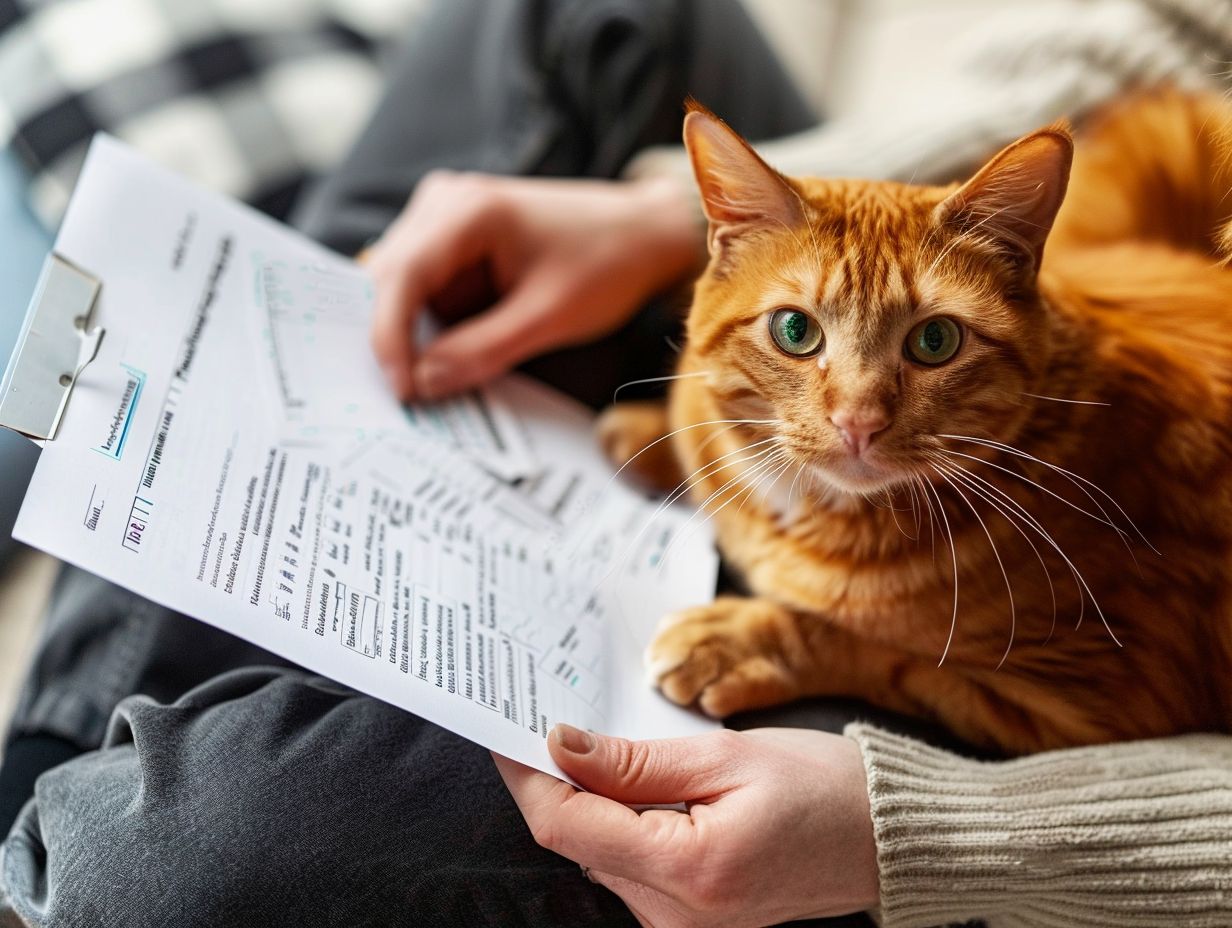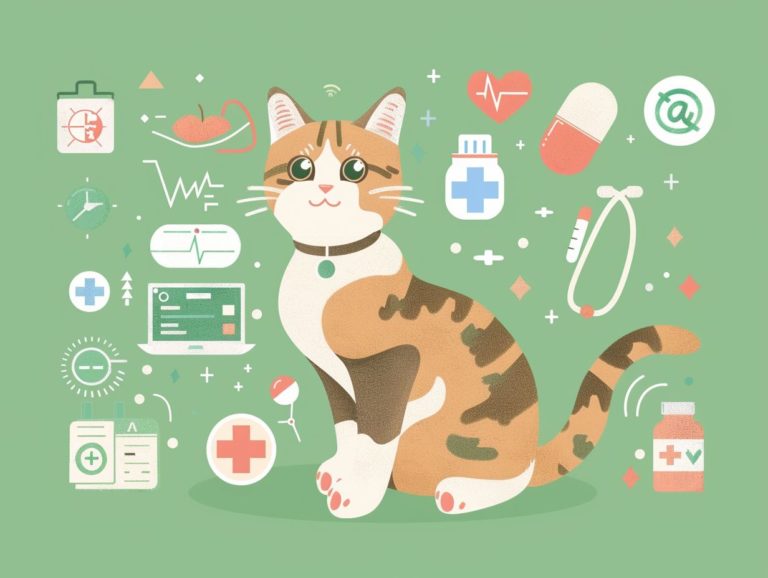What To Do When Your Cats Health Plan Claims Are Denied
This article focuses on understanding and appealing the denial of claims on a cat’s health insurance policy. It comprises the following sections:
- Understanding your cat’s health plan (benefits and reasons for claim denial)
- How to appeal a denied claim
- Other ways to cover medical expenses
- Tips for avoiding denied claims
The information provided in this article aims to assist in providing the best possible care for your feline companion.
Key Takeaways:

Understanding Your Cat’s Health Plan
The “Your Cat’s Health Plan” refers to a pet insurance policy that offers coverage for your cat’s health, ensuring they receive necessary care and financial support for various medical needs. ManyPets provides a range of pet insurance plans that cater to different conditions and requirements. These plans are crucial for cat owners as they offer financial protection, enabling them to afford essential veterinary care without the burden of high costs.
When a claim arises, cat owners can submit invoices and medical records to the insurance company for reimbursement. Typically, the coverage includes illnesses, accidents, diagnostic tests, surgeries, medications, and sometimes routine preventive care. Pre-existing conditions are usually not covered, though some policies may provide coverage after a waiting period. While denied claims can be frustrating, cat owners can take steps to appeal by providing additional documentation or seeking clarification from the insurance company.
Coverage and Benefits
The coverage amount and the types of benefits offered by pet insurance policies can vary depending on the provider and the specific plan. Coverage may include treatments for various conditions and the inclusion of working animals in specific regions like the United States and Canada. Additional benefits could encompass alternative therapy, prescription medication coverage, and behavioral training session coverage.
Adding extra benefits can be beneficial for individuals seeking comprehensive services for their pets. Some pet insurance plans may require policyholders to request coverage, with decisions made on a case-by-case basis. This could be the process for certain alternative therapies, such as acupuncture.
Maintaining thorough documentation of medical records is essential for managing a pet’s health with insurance. Veterinarians utilize SOAP notes (Subjective, Objective, Assessment, Plan) to document a pet’s medical history, treatment progress, and future plans, ensuring a systematic and organized approach to effective pet healthcare management.
Reasons for Claim Denial
Pet owners need to understand the reasons for claim denial to make informed decisions when buying pet insurance and to advocate for themselves when claims are denied. Pet insurance claim denial can result from policy limitations, specific conditions, and the claims review process used by the pet insurance company.
Policy limitations play a significant role in claim denial as they outline circumstances where coverage may not apply. For instance, if the pet has a pre-existing condition, if the condition is not covered by the insurance policy, or if the documentation submitted is insufficient.
Inadequate documentation is a leading cause of claim denials, underscoring the importance of providing complete and accurate information for pet insurance claims. In cases where a claim is denied, it is possible to appeal the decision by submitting additional evidence or requesting an external review by a third-party organization, which can help ensure a fair assessment.
Common Exclusions and Limitations

Exclusions and limitations in pet insurance will vary among providers such as UHC, BCBS, and Cigna Dental, as well as within individual policies, including coverage for dental care in areas like Chattanooga, TN. Understanding your policy is crucial.
One common exclusion in pet insurance policies is pre-existing conditions, where any illness your pet has before the policy’s start date may not be covered. It is essential to check if your chosen provider covers hereditary conditions or behavioral problems.
Another limitation to consider is age restrictions for enrolling your pet in insurance. Some policies may exclude coverage for certain high-risk activities or elective procedures. It is important to carefully review the policy’s details to understand what is and is not covered.
Appealing a Denied Claim
Appealing a Denied Claim involves the process that a pet owner follows to challenge a denial of a claim by an insurance provider. ManyPets and CatHealthEnrollment offer avenues for appealing denied claims, with a formalized process that allows for documentation submission and review requests. Documentation plays a critical role in the appeal process, as it offers evidence to support the pet owner’s case.
To initiate the appeal process, gather all necessary documents, including vet records, invoices, and any prior communication with the insurance provider regarding the claim. Once the required documentation is assembled, it should be submitted in accordance with the specific guidelines of the provider, such as ManyPets and CatHealthEnrollment, which have internal teams dedicated to reviewing appeals and finding resolutions. It is essential to comprehend the roles of the various entities involved in the appeal process, such as claims adjusters and appeals specialists.
Steps to Take and Information to Gather
Pet owners in Salt Lake City, UT who are appealing a denied claim must follow specific steps to strengthen their appeal and gather relevant information. A crucial part of filing a successful appeal involves gathering documents such as prescriptions, medical records, and treatment plans. Once these documents have been collected, it is important to thoroughly review the denial letter to understand the reasons for the denial.
Armed with this information, discussing the appeal with your veterinarian in Salt Lake City, UT is essential. Your vet can offer valuable insights and potentially provide additional documentation to support your appeal. Obtaining cost estimates or exploring alternative treatment options from resources like GoodRx or Caterpillar can also be pivotal in strengthening your case.
Alternative Options for Covering Medical Costs
It is important for pet owners to explore alternative options for covering medical costs, especially those in need of alternative pet insurance options beyond traditional providers. Alternative insurance providers like UHC and BCBS offer various insurance plans, while services such as GoodRx provide discounts on prescription medications, offering effective ways for pet owners to manage medical expenses.
Veterinary clinics and hospitals also offer payment plans that allow for the gradual spreading out of costs for procedures or treatments over a specified period. Utilizing prescription discount services like GoodRx can significantly alleviate the financial burden of ongoing medications for pets with chronic conditions. Employing a holistic approach that combines these methods enables pet owners to reduce the overall cost of veterinary care for their pets.
Other Insurance Options and Payment Plans

Along with traditional pet insurance, other insurance options and payment plans provide pet owners with added flexibility in managing pet healthcare costs. These options include insurance plans for working animals, some of which offer routine care coverage, and a variety of insurance providers that offer different types of insurance options.
Payment plans, whether in the form of monthly installments or annual lump-sum payments, offer ways to spread veterinary costs over time. Pet owners can also explore discounts on pet medications from companies like GoodRx to reduce out-of-pocket expenses.
It is important for pet owners to research and compare different insurance alternatives to find the best plan that suits their pet’s needs and financial constraints. By understanding the range of available options, pet owners can ensure that their pets receive necessary care without facing financial strain.
Preventing Claim Denials in the Future
Preventing claim denials in the future involves understanding your policy, prioritizing preventative care, and being prepared for appeals. To begin with, understanding your policy is essential. It is crucial to be familiar with the details of your pet insurance policy to prevent claim denials.
Prioritizing routine care, such as wellness check-ups, vaccinations, and dental cleanings, not only helps prevent illness and disease but also reduces the likelihood of claims being denied.
Being prepared for appeals is also important. Having detailed medical records and other necessary paperwork for your pet will streamline the appeals process. According to Pet MD, demonstrating a good understanding of your pet’s care, compliance with the veterinarian’s advice, and familiarity with the insurer’s requirements and restrictions can strengthen your appeal.
Tips for Maximizing Coverage and Avoiding Denials
Pet owners can enhance coverage and reduce claim denials by following specific tips designed to enhance their understanding of insurance policy terms, prioritize preventive care, and prepare for potential appeals. These tips assist pet owners in being as proactive and informed as possible to maximize their insurance benefits.
One tip is to ensure regular check-ups and vaccinations for your pet to maintain their health and detect any issues early on. Keeping detailed records of your pet’s medical history and treatments is another beneficial tip.
Understanding the policy terms and conditions is crucial, so take the time to thoroughly review them to avoid surprises when submitting a claim. Being aware of any pre-existing conditions that may impact coverage can also aid in setting expectations and preparing for potential out-of-pocket expenses in advance.
Frequently Asked Questions
What should I do if my cat s health plan claim is denied?

If your cat s health plan claim is denied, the first thing you should do is carefully review the denial letter from your insurance provider. This will outline the specific reason for the denial and may provide instructions on how to appeal the decision.
How can I appeal a denied claim?
To appeal a denied claim, you will typically need to submit a written request to your insurance provider. This request should include any relevant medical records, receipts, and a letter explaining why you believe the claim should be covered.
What if my insurance provider denies my appeal?
If your appeal is denied, you may have the option to request a second appeal or to seek assistance from a third party. It s important to carefully review your insurance policy to understand your options and any time limits for appealing.
Can I still get treatment for my cat if the claim is denied?
Yes, you can still seek medical treatment for your cat even if the claim is denied. However, you will be responsible for covering the cost of the treatment out of pocket.
Why would my cat s health plan claim be denied?
There are several reasons why a cat s health plan claim may be denied. These can include pre-existing conditions, treatment that is not covered by the insurance policy, or missing or incorrect information on the claim form.
How can I avoid claim denials in the future?
To avoid claim denials in the future, it s important to carefully review your insurance policy to understand what is and isn t covered. You should also make sure to provide accurate and complete information when submitting claims and to seek pre-authorization for any treatments that may require it.

